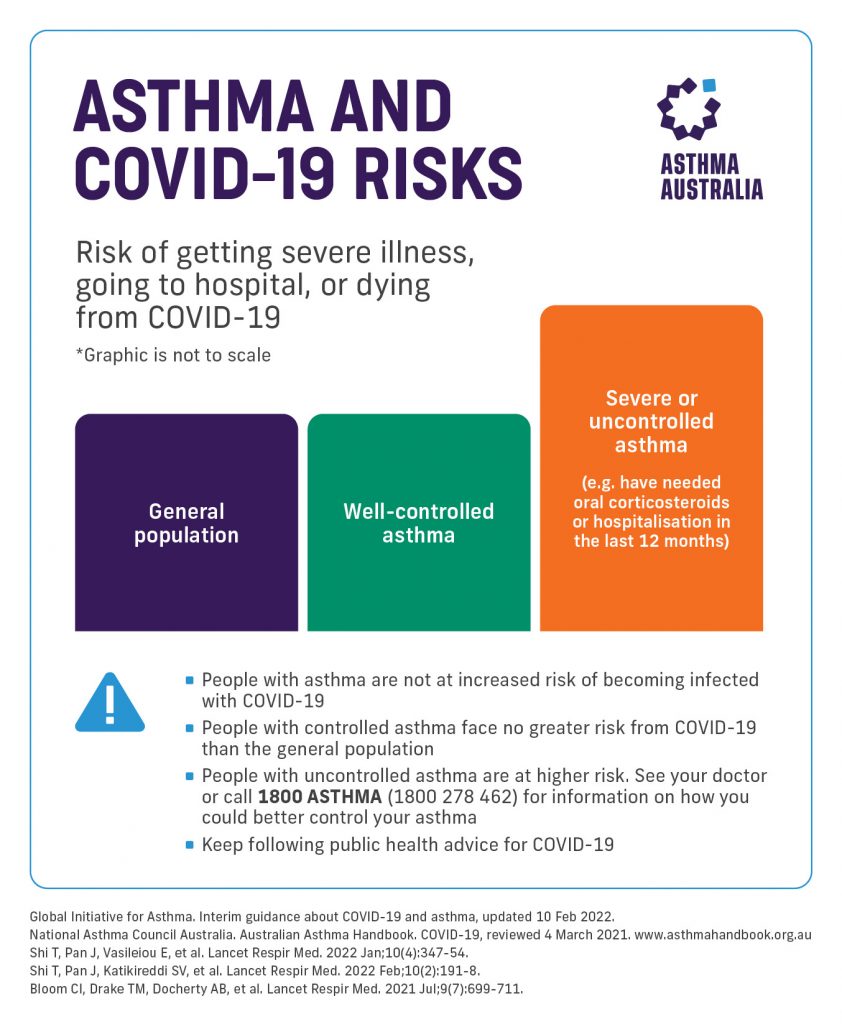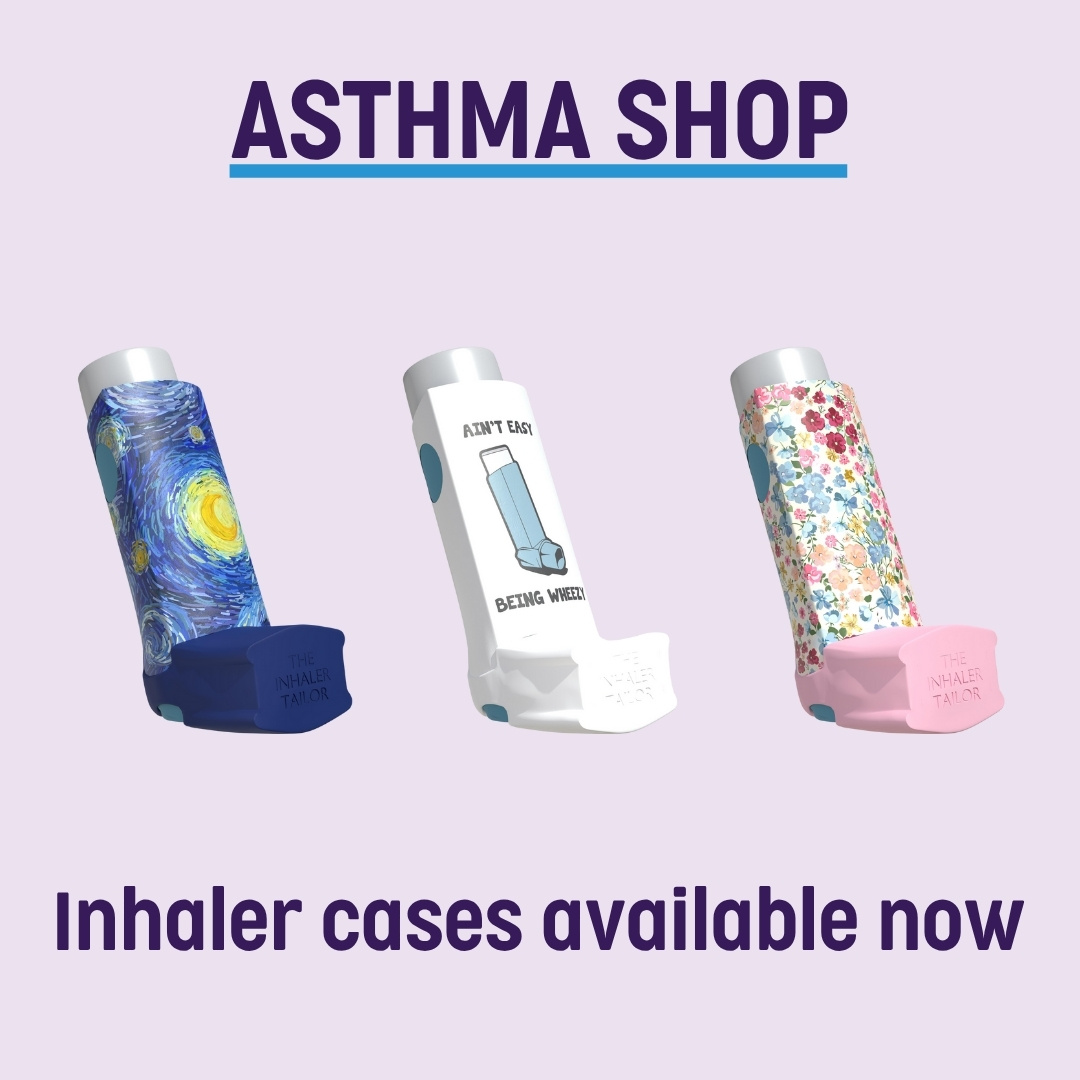Updated 7/02/2023
Do you have Severe Asthma? Find brand new information and resources here: https://asthma.org.au/about-asthma/severe-asthma/
What is Severe Asthma?
A small proportion of people with asthma have a diagnosis of severe asthma or are on a pathway to getting a diagnosis
People with severe asthma are encouraged to get any additional booster doses of the COVID-19 vaccine as advised by their health care professional.
Someone with severe asthma will still have regular asthma symptoms and asthma attacks despite being on high doses of medication. Their asthma does not respond or get better with usual asthma medicines.
Severe asthma is very difficult to treat. People will need high doses of inhaled medication plus specialised medicines in a lot of cases. People with severe asthma will try a lot of medicines over their life. They will experience persistent and life-threatening breathing problems and need emergency care on a regular basis.
Having severe or uncontrolled asthma may be a factor that worsens COVID-19 outcomes.
During COVID-19, you should continue to take all your asthma medications as prescribed. This includes oral corticosteroids (prednisone, prednisolone and dexamethasone) or monoclonal antibodies (biologics) to treat a flare-up or as a regular medication. There is no evidence so far that using monoclonal antibodies for asthma could make you more likely to get COVID-19 or to get more severe disease. Do not stop any medications without first speaking to your doctor.
People with severe asthma can and should have a COVID-19 vaccine and booster. An extra ‘winter booster’ (usually the fourth dose) is now recommended for people at increased risk of severe illness. This includes people with severe asthma.

Self-isolation recommendations
During the COVID-19 pandemic, Australian expert leaders in severe asthma have recommended that people with severe asthma self-isolate from others and practice strict physical distancing when COVID-19 is spreading in their community.
If you are working, talk to your employer or workplace about having a risk assessment. Ask your doctor for a personalised letter explaining the extra precautions recommended for people with severe asthma. Try to find ways you can continue to take part in work, school and community activities in a safe manner.
If self-isolation is not possible for you, we suggest that you could take reasonable extra precautions like:
- Wearing masks when indoors (including in public transport).
- Working from home where possible.
- Get groceries and other essential items delivered, where possible.
- Avoiding crowded areas.
- Limit visiting restaurants or bars where many people around you will not be wearing masks.
- Exercise in open spaces like parks or natural environments
Emotional impact
We understand that this health protection message can be quite stressful to hear.
During these times we are isolated from our communities. We need to pay careful attention to our emotional wellbeing. The following are things you can try to do to stay on top of your mental and emotional wellbeing:
- Find an activity that will help you achieve satisfaction or ‘flow’, this can be anything like music, art, craft, building, projects, gardening, or writing.
- Try to stay connected. Even by telephone and video can help. Social connectedness can help counteract negative feelings that can come on during the pandemic
- Limit your consumption of media. Identify 2-3 trusted sources and limit how much time per day you consume news media
- Actively try to stay on top of your wellbeing by controlling the controllable:
- Follow expert advice, maintain good personal hygiene, keep check of your positive attitude
- Find a routine, do things you enjoy and try new things
- Keep perspective, manage expectations and make future plans
- Stay physically active, eat nutritionally and limit alcohol intake
Many services exist where trained professionals are in place to listen to your concerns and provide some guidance, tips, and resources.
- Lifeline 13 11 14 operating 24 hours a day, 7 days a week
- Kids Helpline – for children that may need support 1800 551 800 https://kidshelpline.com.au
- Beyond Blue – 1300 22 4636 https://beyondblue.org.au
- Head to Health – provides links to trusted Australian online and phone supports, resources, and treatment options https://headtohealth.gov.au/
Read more about Mental Health and COVID-19 here

Call 1800 ASTHMA to speak to one of our specialist Asthma Educators if you have questions.
For more information on Severe Asthma, click here.
References:
Centre of Excellence in Severe Asthma. Clinical Recommendations for COVID-19 in Severe Asthma. Version 2, 7th May 2021. https://www.severeasthma.org.au/wp-content/uploads/2021/05/COVID-19-CRE-Recommendations-7-May-2021-v2.pdf
National Asthma Council Australia. Australian Immunisation Handbook, Version 2.2. COVID-19. https://www.asthmahandbook.org.au/clinical-issues/covid-19
Last reviewed 7/02/2023





 1800 278 462
1800 278 462



